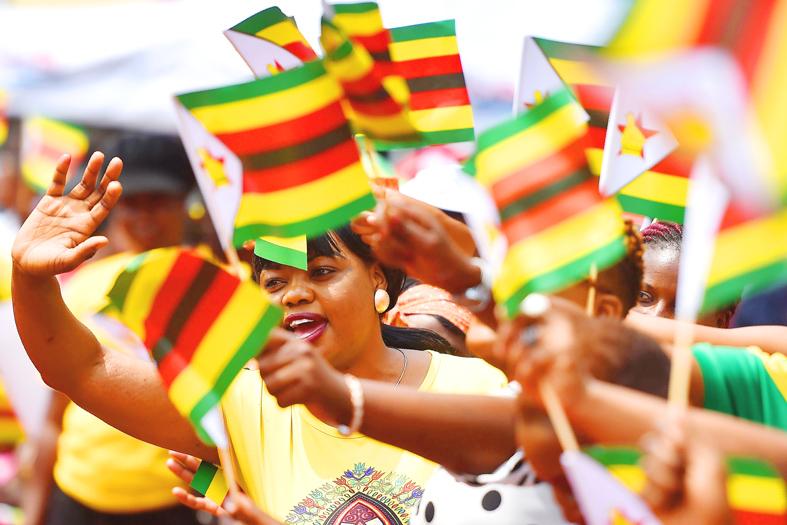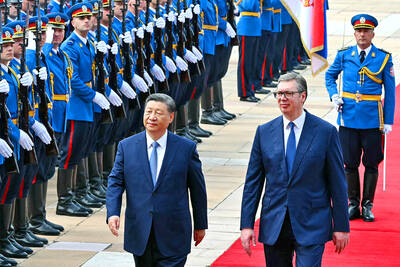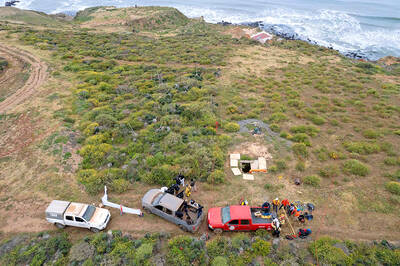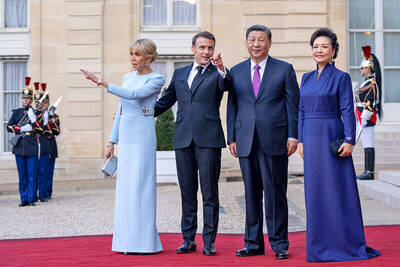Former Zimbabwean president Robert Mugabe stepped down on Nov. 21, 2017, bringing an end to nearly four decades of iron-fisted rule.
His resignation came days after military tanks rolled through the capital, Harare. The coup was greeted with euphoria, tens of thousands pouring into the streets to celebrate.
Today, three years after his successor, Zimbabwean President Emmerson Mnangagwa, took over, the high hopes for change have dissipated into disaffection.

Photo: AFP
“Nothing has changed. Things have only got worse,” said Ibbo Mandaza, head of the Harare-based Southern African Political and Economic Series.
“Look at the levels of poverty. Look at the repression. Things are much worse,” Mandaza said.
On assuming power, Mnangagwa pledged to fix the country’s moribund economy, which had taken a battering under Mugabe’s watch.
The economic woes — including the foreign currency crunch which plagued Mugabe’s rule — remain, the promise of new jobs still a pipe dream for many.
While some goods that were once either scarce or inaccessible are readily available, most of the population cannot afford basic necessities.
The UN World Food Programme, which has traditionally provided aid to the poor in rural areas, has expanded its reach to urban dwellers.
The World Bank predicts the economy will contract by 10 percent this year, while the government says it will shrink 4.5 percent due to macroeconomic and COVID-19 shocks.
Mnangagwa has blamed the economic struggles on unnamed enemies.
“This battle is being fueled by our political detractors, elite opportunists and malcontents who are bent on pushing a nefarious agenda,” he said.
The ruling ZANU-PF party on Friday said that that at least 500,000 formal jobs had been created under Mnangagwa.
Mnangagwa’s government has targeted opposition figures, rights activists and lawyers in what is seen as a tactic to strike fear into a restive population.
Human rights monitoring group Zimbabwe Peace Project said that since November 2017 it has documented 7,962 cases of abuse, including abductions of about 100 activists and opposition figures by suspected state agents or pro-government supporters.
Rights abuses “are worse and more gruesome,” prominent human rights activist Jestina Mukoko said.
In 2018, six people were gunned down when soldiers deployed to quell protests over delayed election results. Five months later 17 others were killed after the military was sent out to quell demonstrations over a fuel price hike.
Award-winning journalist Hopewell Chin’ono has been detained twice this year — once for endorsing anti-corruption protests and earlier this month for writing on Twitter about plans to grant bail to a politically connected miners chief arrested trying to smuggle gold.
University of Zimbabwe political scientist Eldred Masunungure said that the present picture “points to a comprehensively volatile situation.”
“Nothing points to stability, but I don’t want to overstate this because we have reached this crossroads many times before and the country has not collapsed. The default position in the country is one of instability. It appears like the new normal,” he said.
“It’s an exceptional case where the regime survives despite the volatility, where citizens don’t rise up despite the simmering anger. The regime staggers, but does not fall. That’s the mystery of our situation,” he said.
On the streets of Harare, resident Timothy Bhaureni said that “things cannot continue this way.”
“These people should just admit they have failed,” he said.
“Little did we know that we were swimming into a pool infested with crocodiles,” Itai Tione Wasu wrote on Twitter.
“Mugabe had to go, but I regret allowing myself to endorse the coup,” he added.

MONEY MATTERS: Xi was to highlight projects such as a new high-speed railway between Belgrade and Budapest, as Serbia is entirely open to Chinese trade and investment Serbian President Aleksandar Vucic yesterday said that “Taiwan is China” as he made a speech welcoming Chinese President Xi Jinping (習近平) to Belgrade, state broadcaster Radio Television of Serbia (RTS) said. “We have a clear and simple position regarding Chinese territorial integrity,” he told a crowd outside the government offices while Xi applauded him. “Yes, Taiwan is China.” Xi landed in Belgrade on Tuesday night on the second leg of his European tour, and was greeted by Vucic and most government ministers. Xi had just completed a two-day trip to France, where he held talks with French President Emmanuel Macron as the

With the midday sun blazing, an experimental orange and white F-16 fighter jet launched with a familiar roar that is a hallmark of US airpower, but the aerial combat that followed was unlike any other: This F-16 was controlled by artificial intelligence (AI), not a human pilot, and riding in the front seat was US Secretary of the Air Force Frank Kendall. AI marks one of the biggest advances in military aviation since the introduction of stealth in the early 1990s, and the US Air Force has aggressively leaned in. Even though the technology is not fully developed, the service is planning

INTERNATIONAL PROBE: Australian and US authorities were helping coordinate the investigation of the case, which follows the 2015 murder of Australian surfers in Mexico Three bodies were found in Mexico’s Baja California state, the FBI said on Friday, days after two Australians and an American went missing during a surfing trip in an area hit by cartel violence. Authorities used a pulley system to hoist what appeared to be lifeless bodies covered in mud from a shaft on a cliff high above the Pacific. “We confirm there were three individuals found deceased in Santo Tomas, Baja California,” a statement from the FBI’s office in San Diego, California, said without providing the identities of the victims. Australian brothers Jake and Callum Robinson and their American friend Jack Carter

CUSTOMS DUTIES: France’s cognac industry was closely watching the talks, fearing that an anti-dumping investigation opened by China is retaliation for trade tensions French President Emmanuel Macron yesterday hosted Chinese President Xi Jinping (習近平) at one of his beloved childhood haunts in the Pyrenees, seeking to press a message to Beijing not to support Russia’s war against Ukraine and to accept fairer trade. The first day of Xi’s state visit to France, his first to Europe since 2019, saw respectful, but sometimes robust exchanges between the two men during a succession of talks on Monday. Macron, joined initially by EU Commission President Ursula von der Leyen, urged Xi not to allow the export of any technology that could be used by Russia in its invasion